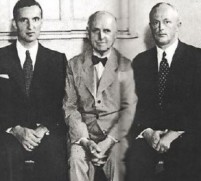BRAZIL. THE HARD ROAD TO WAR * - THE HARD ROAD TO WAR
17)RELATIONS BRAZIL GERMANY 1942
In the 1930s, Brazil was home to one of the largest German populations outside Germany, with 100,000 German-born people and a community of 1 million people of German descent, whose ancestors had been settling the country since 1824. Brazil also had the largest number of members of the Nazi Party outside of Germany, with 2,822 members. The large number of people with German roots and a notable number of Nazi members were used by the Brazilian government to justify their programs of nationalization. During World War II, in 1942, Nazi Germany attacked Brazilian ships and Brazil declared war against Germany.
President Getúlio Vargas initiated a strict program of forced cultural assimilation –Nacionalismo- that worked quite efficiently, if not initially. He forbade any organised manifestation of German culture in Brazil. Schools were required to teach exclusively in Portuguese, and the publishing of books, newspapers and magazines in foreign languages (which in practice meant German language and Italian language) was subjected to prior censorship by the Ministry of Justice The use of foreign languages in governmental precincts was forbidden, as well as the use of foreign languages in religious services. Members of the Brazilian army were sent to areas of "foreign colonization" to "monitor" the local population. There are records of arrest or moral coercion motivated by the use of foreign languages.
NAZISM
These problems were aggravated with the rise of Nazism in Germany. The Nazi Party soon took to the task of organizing abroad, wherever significant populations of German origin were present. In Brazil, the results were not as the party expected. About 3,000 people joined it, making the Brazilian section the numerically most important foreign branch of the Nazi Party; however, the considerable population of German origin in Brazil may have been more a problem than an asset for the German Nazi Party: if on the one hand it raised the hope of interfering in Brazilian internal politics, on the other hand there was a concern not to alienate the Brazilian government, which Germany at the time hoped could be brought to its side, or at least remain in a benevolent neutrality.
In addition there was the issue of the local Brazilian traditionalist syncretic party, the Brazilian Integralist Action. In contrast to the Nazi Party, the Integralists favoured miscegenation, and had the rural sertanejo as a noble ideal of representation of the people, which they thought was essential to Brazilian national identity; this directly conflicted with the Nazi ideology of racial purity. This was a problem, since the Integralists were able to attract some membership among Brazilians of German ancestry, thus competing with the Nazi organisation; moreover, until 1937, when Vargas imposed a dictatorship, the Integralists, unlike the Nazi Party, were able to participate in elections, and so there was a natural tendency of informal Nazi support for the Integralists.
Support for the Nazi regime in Germany was widespread among Brazilians of German descent, which certainly worried the Brazilian authorities. The racial and nationalist views of the Nazis easily blended into the Deutschtum ideology. However, the Nazis weren't able to capitalise this into a really strong membership, and their local actions, such as proposed boycotts, were resisted by most of the population of German ancestry.
In fact, the fears of the Brazilian authorities regarding the expansion of Nazism in Brazil seem exaggerated in retrospect; however, it should be taken into consideration that in 1938 Germany annexed Austria, and in 1939 it dismembered, then also annexed Czechoslovakia, and that the local sections of the Nazi Party were fully involved in these actions; manipulation of German minorities also played an important role in the internal politics of Poland (Danzig) and Lithuania (Memel). So, while exaggerated, the Brazilian government's worries seem to a certain extent justifiable.
From Rolf Hoffmann's archive, roll 29, frames 26.600-656, mentioned by Alton Frye in "Nazi Germany and the American Hemisphere, 1933-1941", p. 101-102, the Brazilian diplomat Sérgio Corrêa da Costa, in the book 'The history of a secret war' ('Crônica de uma guerra secreta' in Portuguese), reveals that Hitler had planned to colonize Brazil (which several historians from the English speaking world had already shown, as well as the testimony of Rauschning, who was present when Hitler spoke of plans of colonizing Brazil).
The plan was not new. In his "Gross Deutschland, die Arbeit des 20. Jahrhunderts", published in Leipzig, 1911, Tannenberg outlines the principle of partition of Central and South American between the great powers, to Germany belonging the subtropical part facing the Atlantic Ocean:
"South America will provide a space of colonization where our immigrants will keep their language and autonomy. We will demand that German be taught in the schools as a second language. Southern Brazil, Paraguay and Uruguay will become German culture countries and German will be their national language. Otto Tannenberg."
In April 1938, Vargas outlawed the Nazi Party in Brazil (the Brazilian parties themselves were outlawed in December 1937). However, in December 1937 the Nazi German Ambassador to Rio de Janeiro, Karl Ritter, was already reporting nationalising actions by the Brazilian government. At that moment, conditions were being imposed for the continued functioning of German schools. Ritter had a problem in that his powers as Ambassador did not enable him to interfere on behalf of Brazilian citizens of German origin. However, in February 1938 Ritter met Vargas, and demanded criticism of Germany and Nazism in the Brazilian press be gagged. As confirmed by diplomatic documents later declassified, the interest of the embassy was in the Reichsdeutschen, or German citizens, not the Deutschbrasilianer, or Brazilian citizens of German ancestry.
In April, Vargas forbade any political activity by foreigners; in May, the Integralists attempted a coup against Vargas, which further complicated relations between Brazil and Germany. Up to this moment, however, no actions were taken against cultural, religious or sports associations. Measures were intensified in 1939, when the public use of foreign languages was forbidden, including in elementary schools and religious ceremonies (harsh as this is, it is necessary to remember, as René Gertz points out, that about half of Lutheran ministers in Rio Grande do Sul were affiliated with the Nazi Party). The cultural associations had to stop promoting foreign cultures.
In 1942, when Brazil entered World War II, further restrictions were put in place, and their enforcement was made stricter. No effort was made to suppress the Lutheran church; the teaching of foreign languages, including German, in high schools and colleges continued, as well as their private use. Publicly speaking foreign languages, including German, was banned under penalty of imprisonment; this was especially enforced against the public use of German. Stores owned by Germans were ransacked.
Establishments registered in foreign names had to be changed and worship in churches had to be only in Portuguese. During World War II, the Brazilian Expeditionary Force (FEB) enlisted many Germans and people of German descent to fight alongside the Allied forces, which was difficult for many of them, considering that the soldiers were forced to fight against Germany.
There were differences in emphasis during the nationalization campaign; in particular, the interventor (unelected governor) of Rio Grande do Sul, Cordeiro de Farias, was notable for his harshness. At the time of Brazil's declaration of war against Germany, popular riots against citizens of German origin erupted in Rio Grande do Sul, as a response to the sinking of Brazilian merchant ships by German U-boats that resulted in more than 600 deaths. When the Army repressed those riots and ensured the physical integrity of the citizens, Cordeiro de Farias offered his resignation, which was rejected, but he was soon sent to Italy as a military comrmander and replaced by Colonel Ernesto Dornelles, a much more moderate leader.



